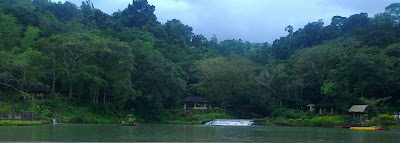BIMBO CABIDOG
Like the leaves in an old calendar, memory fades with the
passage of time. There are events that happened not so long ago that cannot be
revisited anymore. They have faded beyond retrieval by consciousness. They are sealed
in the chamber of the forgotten, buried in oblivion forever.
Frequently I ask: of the many New Years in my life, what
struck most? It struck me that I can’t cite any. As soon as they are gone, they
are forgotten. Besides the kids I have been with, even the one New Year that is
as recent as last year is already a blur.
Is it because everyone has almost always been the same? Every
coming year is supposed to usher something new, but ends up eventually more of
the old. Nothing much leap out of the usual, nor bound into something far different.
There are only the hours that lumber towards the dead of the night, erupt in brief
riotous ecstasy, and fizzles by the break of dawn. The fireworks are anticlimactically
humdrum, simply because they are expected.
Why New Years are not best remembered is obvious. What they commonly
usher are predictably the continuation of the same: time-and-motion affairs of
yesterday that promise no major change. They are anticipated not to spring up
stunning surprises. Even the exploded victims of firecrackers have become commonplace.
The new is nothing but the repetitive occurrences of the trite, the injured who
never learn, the decapitated and plainly shocked that reception with gory clinical
hardware awaits at hospitals.
Much has been made of the millennium crossover in 2000, like
the celestial display of a bursting supernova. Here was the time divide that billions
of folks of different climes strove to attach unprecedented meaning. I imagined
thousands of years of human social history being cut off like a chamber of a shooting
rocket ship and lost in the swirling ranges of space.
But now, it can be looked on hindsight as a passage not much
different from Sunday turning into Monday week after week after week. When the passing
year turns into another day what is not seen, but actually remains, is the
eternal present, phenomena in a flux, the constant coming and going in the ever
living I Am.
What is the future to be elated or worry about? Scrape off
the barnacles of the past that clings to the mind and nothing worries anymore,
because it is they that the mind projects into what is perceived coming. It is
yesterday placed ahead in a state that doesn’t actually exist, that is, the future. Man
sees fearful ghosts of a non-existent future from the lens of history. And to
see ghosts is to believe in ghosts.
The so much fuss about New Year is indeed the apparition of
tomorrow in the sights of yesterday. For tomorrow does not show as tomorrow. It
shows as experience anticipated to be reborn. It has no reality of its own. It
only lives in dreams foregone. It can only be real when it has become the
present.
I have resolved to make the difference now. No New Year’s
resolutions, instead New Year reflections. No presumption of the shape the future
takes, constructed from actually the vanished realities of the past. I greet
the new day of the year, like opening another door and just absorbing and learning what it augurs.
Imagine time being abolished by a new charter of being human.
There are no more hours, days and years. There are only changes, the coming and
going of events or occurrences – physical and spiritual, change in continuum, matter
becoming and vanishing.
People no longer mark living by year, old or new. There is
no beginning or end, only transitions and cycles. In all these, consciousness
has found eternity. Identity is no longer a function of history in slices of
time encapsulated by what the human eye merely wants to see.
Life will be released from the arbitrary sequence of chronology
and interpretation as the limited mind of man conceives. People no longer go down to writhe in the
graveyard of the dead past. They rise up to the joy of living in the here and
now, the appreciation of constant change. No one marks how long each one has
lived or been with something.
When no eyes watch any longer the turning of the hands on
the clock, human life revolving around the time divides will be a thing of the
past, locked forever in the catacombs of the forgotten. By then, the physical, psychological
and psychic benefits will be tremendous. Pressure and stress will bid goodbye.
Man will no longer be a slave of schedules. Deadlines will cease to nag.
The ancient tormenting of the clock as it ticks will lapse
into silence. No one will ever become a nervous wreck, because of a fast approaching
date. The great masses will not blow horns, drag cans on the streets, and light
pyrotechnics to create one powerful blast. They simply don’t know anymore when
to do so. New Years are never again observed for all times.














